
A video game or computer game is an electronic game that involves interaction with a user interface or input device to generate visual feedback from a display device, most commonly shown in a video format on a television set, computer monitor, flat-panel display or touchscreen on handheld devices, or a virtual reality headset. Most modern video games are audiovisual, with audio complement delivered through speakers or headphones, and sometimes also with other types of sensory feedback. Some video games also allow microphone and webcam inputs for in-game chatting and livestreaming.
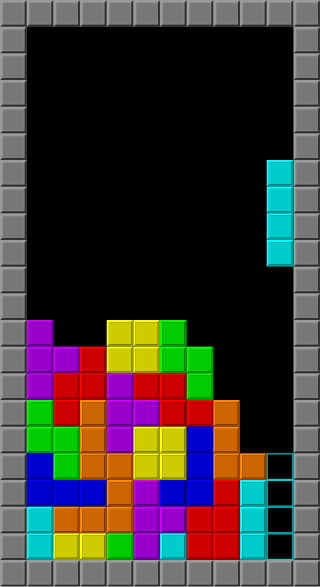
Tetris is a puzzle video game created in 1985 by Alexey Pajitnov, a Soviet software engineer. It has been published by several companies for multiple platforms, most prominently during a dispute over the appropriation of the rights in the late 1980s. After a significant period of publication by Nintendo, in 1996 the rights reverted to Pajitnov, who co-founded the Tetris Company with Henk Rogers to manage licensing.
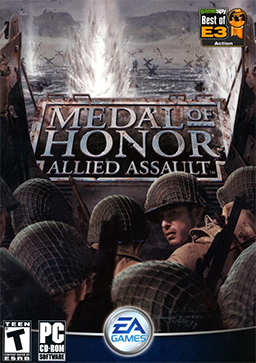
Medal of Honor: Allied Assault is a 2002 first-person shooter video game developed by 2015, Inc. and published by Electronic Arts. It was released for Windows, Mac OS X, and Linux. Allied Assault is the third game in the Medal of Honor series. The game uses the id Tech 3 engine, with modifications from Heavy Metal: F.A.K.K.², to simulate infantry combat in the European and North African theaters during World War II.

A ROM image, or ROM file, is a computer file which contains a copy of the data from a read-only memory chip, often from a video game cartridge, or used to contain a computer's firmware, or from an arcade game's main board. The term is frequently used in the context of emulation, whereby older games or firmware are copied to ROM files on modern computers and can, using a piece of software known as an emulator, be run on a different device than which they were designed for. ROM burners are used to copy ROM images to hardware, such as ROM cartridges, or ROM chips, for debugging and QA testing.
In computing, a clone is hardware or software that is designed to function in exactly the same way as another system. A specific subset of clones are remakes, which are revivals of old, obsolete, or discontinued products.

RollerCoaster Tycoon 3 is a 2004 construction and management simulation video game. It is the third installment in the RollerCoaster Tycoon series, and was developed by Frontier Developments and published by Atari Interactive. RollerCoaster Tycoon 3 places players in charge of managing amusement parks; rides can be built or demolished, terrain and scenery can be adjusted, and prices can be controlled to keep visitors or "peeps" happy.

Graftgold was an independent computer game developer that came to prominence in the 1980s, producing numerous computer games on a variety of 8-bit, 16-bit and 32-bit platforms.
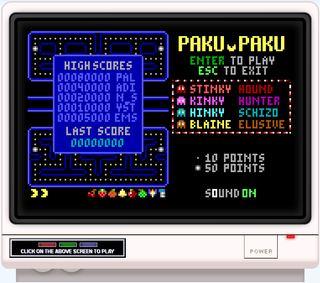
A personal computer game, also known as a computer game or abbreviated PC game, is a video game played on a personal computer (PC).
Video game packaging refers to the physical storage of the contents of a PC or console game, both for safekeeping and shop display. In the past, a number of materials and packaging designs were used, mostly paperboard or plastic. Today, most physical game releases are shipped in (CD) jewel cases or (DVD) keep cases, with little differences between them.
The Interactive Entertainment Merchants Association (IEMA) was a United States-based non-profit organization dedicated to serving the business interests of leading retailers that sell Interactive entertainment software. Member companies of the IEMA collectively accounted for approximately seventy-five percent of the $10 billion annual interactive entertainment business in the United States. The association was established in 1997 by Hal Halpin, its president and founder, and counts among its member companies the largest retailers of games including Walmart, Target Corporation, Blockbuster Entertainment and Circuit City. The IEMA also sponsored an important annual trade show in the promotion of the business of the video game industry called the "Executive Summit".
Hal Halpin is an American computer game executive and entrepreneur, and is the president and founder of the Entertainment Consumers Association (ECA).
The Entertainment Merchants Association (EMA) is the not-for-profit international trade association dedicated to advancing the interests of the $32 billion home entertainment industry.
Igromania is a Russian video game website and formerly a magazine.

An indie game, short for independent video game, is a video game created by individuals or smaller development teams without the financial and technical support of a large game publisher, in contrast to most "AAA" (triple-A) games. Because of their independence and freedom to develop, indie games often focus on innovation, experimental gameplay, and taking risks not usually afforded in AAA games. Indie games tend to be sold through digital distribution channels rather than at retail due to a lack of publisher support. The term is analogous to independent music or independent film in those respective mediums.
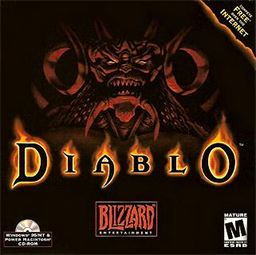
Diablo is an action role-playing video game developed by Blizzard North and released by Blizzard Entertainment in January 1997, and is the first installment in the video game series of the same name.
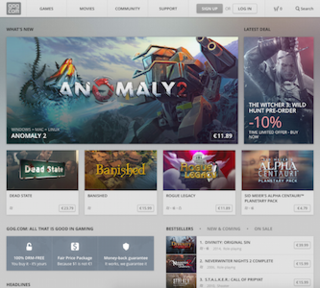
GOG.com is a digital distribution platform for video games and films. It is operated by GOG sp. z o.o., a wholly owned subsidiary of CD Projekt based in Warsaw, Poland. GOG.com delivers DRM-free video games through its digital platform for Microsoft Windows, macOS and Linux.
The United Kingdom has the largest video game sector in Europe. By revenue, the UK had the second-largest video game market in Europe in 2022 after Germany, and the sixth-largest globally. By sales, it is Europe's largest market, having overtaken Germany in 2022. The UK video game market was worth £7.16 billion in 2021, a 2% increase over the previous year.
Humble Bundle, Inc. is a digital storefront for video games, which grew out of its original offering of Humble Bundles, collections of games sold at a price determined by the purchaser and with a portion of the price going towards charity and the rest split between the game developers. Humble Bundle continues to offer these limited-time bundles, but have expanded to include a greater and more persistent storefront. The Humble Bundle concept was initially run by Wolfire Games in 2010, but by its second bundle, the Humble Bundle company was spun out to manage the promotion, payments, and distribution of the bundles. In October 2017, the company was acquired by Ziff Davis through its IGN Entertainment subsidiary.
In the video game industry, digital distribution is the process of delivering video game content as digital information, without the exchange or purchase of new physical media such as ROM cartridges, magnetic storage, optical discs and flash memory cards. This process has existed since the early 1980s, but it was only with network advancements in bandwidth capabilities in the early 2000s that digital distribution became more prominent as a method of selling games. Currently, the process is dominated by online distribution over broadband Internet.
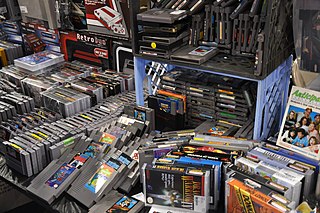
Video game preservation is a form of preservation applied to the video game industry that includes, but is not limited to, digital preservation. Such preservation efforts include archiving development source code and art assets, digital copies of video games, emulation of video game hardware, maintenance and preservation of specialized video game hardware such as arcade games and video game consoles, and digitization of print video game magazines and books prior to the Digital Revolution.










